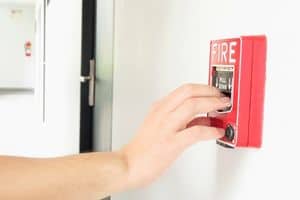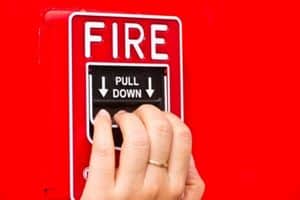There are all sorts of fascinating myths surrounding the fire service. It’s hard to tell where some of them originated, but they can create some pretty strange if not superstitious fears. For instance, you might have heard that if you pull a fire alarm at school or any other building that it will spray ink. Is that true?

Fire alarms do not and never did spray ink. This myth likely originated to deter childhood pranksters from pulling the fire alarm in their schools to impress their friends. Even though a fire alarm doesn’t spray ink, it’s still not a good idea to pull it unless needed.
Does a fire alarm spray anything? When should you pull a fire alarm, anyway? We’ll answer all those questions and more ahead, so make sure you keep reading!
Table of Contents
Do Fire Alarms Spray Ink? Where Does the Ink Myth Come From?
Growing up, did you ever have teachers or parents tell you not to touch the fire alarm at school because if you did, it would spray ink?
You probably believed them, right? Maybe that’s what kept you on the straight and narrow when your school friends dared you to go pull the fire alarm during lunch break or recess. You were so afraid that the ink would be a dead giveaway that you were the one who pulled the alarm, so you never did it.
Well, we’re here to tell you once and for all that fire alarms do not contain ink. If you pull the fire alarm, ink will not come out.
This isn’t some modern take on fire alarms, either. Fire alarms have never sprayed ink and will never spray ink.
The story that they did was simply meant to dissuade curious young kids from causing trouble. After all, pulling a fire alarm for no reason will cause the entire school to have to evacuate, as the alarm indicates that fire is on the premises.
Now, this rumor isn’t completely based on fiction. Touching the actuator of a fire alarm could leave ink residue on your hand, but that’s simply because there’s ink residue on the actuator. It’s not meant to aid school staff in catching whoever pulled the alarm.
That said, back in the 1930s, there was indeed a firebox that would have handcuffed pranksters to the spot, so it’s not like measures weren’t taken to deter people from causing false alarms.
It’s not clear who installed the firebox traps, but it was likely the fire departments at the time rather than schools or buildings.
And before you fear for someone’s safety, don’t worry. The firebox traps were outside so that if someone pulled it and got stuck, they were never at risk of being in a burning building and possibly perishing.
Even today, some fire alarms have tamper dye but not ink.
What Happens If You Pull a Fire Alarm?
Most of us have thought about it, even purely out of a sense of curiosity, but very few of us have done it. We’re talking, of course, about pulling a fire alarm.
What exactly happens once you do it? Allow us to explain.
When you pull a fire alarm, it will begin making a beeping or ringing sound. It can also sound like a siren.
The sound is going to be exceedingly loud because it’s supposed to notify those in the vicinity that a fire could have broken out. It’s your signal to get out of the building since it might be burning.

There’s more to a fire alarm than that. When the alarm gets pulled, the fire control unit that manages the building such as a school or office building will receive an alert that the alarm was tripped.
The fire control unit will contact the local fire department, who will immediately head to the building to put out the fire.
Most of us have been through fire drills before or perhaps even had an instance where someone pulled the fire alarm. Not all fire alarms necessarily require manual effort though. Some are automated.
Hopefully, in the instances you’ve dealt with a blaring fire alarm, it just turned out to be a false alarm caused by a malfunctioning automated system.
That said, even if a fire were occurring, the fire alarm would notify you quickly enough that you and everyone else in the building could get out safely.
When Should You Pull a Fire Alarm?
Okay, so knowing all you do about fire alarms, when is the right time to pull one?
There’s only one answer. Well, two answers.
Those are when you know there’s a fire or when you have a strong reason to suspect there’s a fire.
For instance, if you can smell smoke and you’re sure it’s not coming from outside, then even though you don’t see a fire, it might be a good idea to pull the smoke alarm. It’s an especially good idea if you’re in a multistory building.
Otherwise, only pull the alarm when you know a fire is occurring on the premises.
What If You Pull a Fire Alarm and There Is No Fire?
When we explained how fire alarms work before, we hope we made it clear that whether there’s a fire or not, the fire department will come out to your school, home, or building.
If they venture out for no reason, that’s detrimental to the health and wellbeing of others. In the meantime, there’s a fire elsewhere that the fire department could have extinguished, but they’re here where there is no fire.
Unsurprisingly, falsely pulling a fire alarm is often treated as a crime. It very much depends on where in the country you live, but there is usually a penalty for false alarms.
At the very least, you could be slapped with a disorderly conduct charge for causing unnecessary panic.
You could also be fined, usually $50 for your first offense and then $150 for any subsequent offense up to $500 for 10 false alarms.
In some parts of the country, pulling the fire alarm when there’s no fire is even categorized as a Class 4 felony. Under a Class 4 felony, you could face fines up to $10,000 and one to three years in jail.
It simply isn’t worth it!
Fire alarms will not spray ink, but some have been known to release a dye to mark those who falsely pull the alarms.
These precautions are to prevent kids and other pranksters from pulling a fire alarm when there is no fire. Fire departments end up wasting valuable time and resources coming out to address the issue.
Pulling false alarms will often result in fines and criminal punishment, including jail time in some cases!